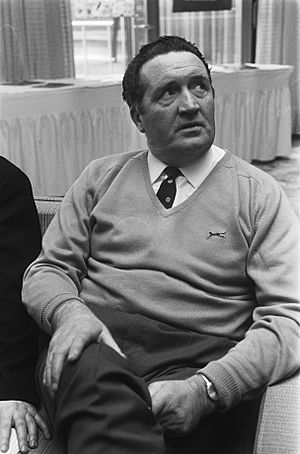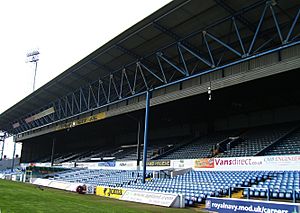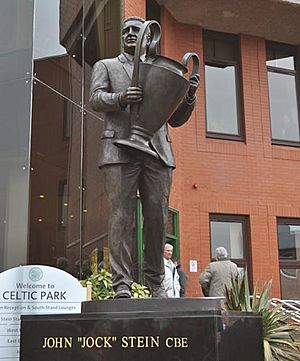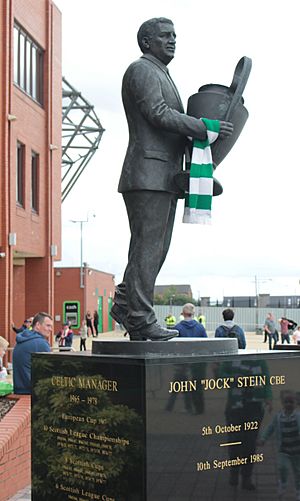Jock Stein facts for kids

Stein in 1971
|
|||
| Personal information | |||
|---|---|---|---|
| Full name | John Stein | ||
| Date of birth | 5 October 1922 | ||
| Place of birth | Burnbank, Lanarkshire, Scotland | ||
| Date of death | 10 September 1985 (aged 62) | ||
| Place of death | Cardiff, Wales | ||
| Position(s) | Centre half | ||
| Youth career | |||
| 1940–1942 | Blantyre Victoria | ||
| Senior career* | |||
| Years | Team | Apps | (Gls) |
| 1940–1942 | Blantyre Victoria | ||
| 1942–1950 | Albion Rovers | 215 | (6) |
| 1950–1951 | Llanelli Town | 44 | (5) |
| 1951–1957 | Celtic | 106 | (2) |
| Total | 365 | (13) | |
| International career | |||
| 1954 | Scottish League XI | 1 | (0) |
| Managerial career | |||
| 1960–1964 | Dunfermline Athletic | ||
| 1964–1965 | Hibernian | ||
| 1965 | Scotland | ||
| 1965–1978 | Celtic | ||
| 1978 | Leeds United | ||
| 1978–1985 | Scotland | ||
| *Club domestic league appearances and goals | |||
Jock Stein (born October 5, 1922 – died September 10, 1985) was a famous Scottish football player and manager. He was the first manager from a British team to win the European Cup with Celtic in 1967. Stein also led Celtic to win nine Scottish League championships in a row from 1966 to 1974.
Stein worked as a coal miner while playing football part-time for local clubs. He later became a full-time professional player with Welsh club Llanelli Town. In 1951, he returned to Scotland to play for Celtic. He had a successful time there, winning the Coronation Cup in 1953. He also helped Celtic win both the Scottish League and the Scottish Cup in 1954. Stein had to stop playing football in 1957 because of ankle injuries.
After retiring as a player, Celtic asked Stein to coach their reserve team. He started his career as a manager in 1960 with Dunfermline. There, he won the Scottish Cup in 1961. After a short but successful time at Hibernian, Stein came back to Celtic as manager in March 1965. During his thirteen years at Celtic, he won the European Cup, ten Scottish league championships, eight Scottish Cups, and six Scottish League Cups. After a very short time with Leeds United, Stein managed the Scotland team from 1978 until his death in 1985.
Contents
Playing Football: Jock Stein's Early Career
Jock Stein was born in Burnbank, Lanarkshire, Scotland. He saw football as a way to escape working in the coal mines. In 1937, after leaving school, he worked briefly in a carpet factory before becoming a miner. In 1940, he joined Blantyre Victoria, a local junior football club.
Stein first played for a senior club, Albion Rovers, in November 1942. He continued to work as a miner during the week. This was important during World War II, as mining was a "reserved occupation." This allowed him to play football regularly. Albion Rovers won promotion to the First Division in 1948.
In 1950, Stein joined the Welsh club Llanelli. For the first time, he became a full-time professional footballer. He earned £12 a week. His wife, Jean, and young daughter, Ray, joined him later. However, their home in Scotland was burgled, and Jean wanted to return. Stein felt disappointed with problems at the club and decided to leave.
In December 1951, Celtic bought Stein for £1,200. He was meant to be a reserve player. But injuries to other players meant he quickly joined the first team. In 1952, he became vice-captain. When the captain, Sean Fallon, broke his arm, Stein became the team captain.
Celtic finished eighth in the Scottish League in 1953. They were invited to the Coronation Cup tournament because they had so many fans. Celtic beat strong teams like Arsenal and Manchester United to win the trophy. This success continued in 1954. Stein captained the team that won both the League and the Scottish Cup. This was their first League championship since 1938. As a reward, the club paid for all the players to go to the 1954 FIFA World Cup in Switzerland. Stein was very impressed by the strong performance of the Hungarian team when he saw them play England in 1953.
In 1954, Stein played his only international game for the Scottish Football League XI. It was a tough game, and his team lost 4-0.
In 1955, Celtic finished second in the league. They lost the Scottish Cup Final to Clyde. Stein had to retire from football in 1957 because of ongoing ankle injuries. He had an operation, but his ankle became infected. He could no longer move the joint properly and had to stop playing.
Jock Stein: A Managerial Legend
Starting Out: Coaching Celtic Reserves
In July 1957, Stein became the coach for the Celtic reserve team. His team included young players who would later become stars under him, like Billy McNeill and Bobby Murdoch. In his first season, Stein won the Reserve Cup. His team beat Rangers 8-2 over two games.
Leading Dunfermline to Glory
On March 14, 1960, Stein became the manager of Dunfermline. The team was struggling and close to being relegated. They hadn't won a game in four months. But under Stein, they won their first six matches! To make the team even stronger, Stein signed new players. He led Dunfermline to their first-ever Scottish Cup victory in 1961. They beat Celtic 2-0 in a replayed final. This success led to job offers from bigger clubs, but Stein stayed.
In the 1961–62 season, Dunfermline reached the quarter-finals of a European competition. They also finished fourth in the league. Towards the end of the 1963–64 season, it became clear that Hibernian wanted Stein as their manager. On March 30, it was announced that Stein would leave Dunfermline right away to join Hibernian.
Success at Hibernian
Stein became manager of Hibernian in March 1964. Even though Hibs had many fans, the club was not doing well. Stein immediately made a difference. He took an active part in training, which was new for the players. He built a strong defense and helped talented but underperforming players shine. Stein led Hibs to win the Summer Cup, their first trophy in ten years.
His success at Hibs attracted attention from English clubs. Stein then spoke to Celtic chairman Bob Kelly. He hoped to be offered the Celtic job, which was his dream. Kelly first offered him a lesser role, but Stein wanted full control. Eventually, Kelly agreed to give Stein full power over team selection. Hibs tried to convince him to stay, but Stein's ambition was to manage Celtic. He even helped Celtic sign some players before he officially moved.
On January 31, it was announced that Stein would move to Celtic at the end of the 1964–65 season. He left Hibs in early March. When he left, Hibs were near the top of the league and in the Scottish Cup semi-finals. Stein later said leaving Hibs at that time was one of his most embarrassing moments.
Celtic's Golden Era: The Lisbon Lions
Stein returned to Celtic in March 1965. He was the club's first Protestant manager. Celtic was struggling in the league. Stein's first game was a big 6-0 win. Celtic had reached the semi-finals of the Scottish Cup before Stein arrived. He gave the players tactical advice they had never received before. Celtic won their semi-final and then beat Dunfermline in the 1965 Scottish Cup Final. This was Celtic's first Scottish Cup since 1954.
For the 1965–66 season, Stein signed Joe McBride, who scored 43 goals that season. Celtic won the League Cup final against Rangers. They also reached the semi-finals of the UEFA Cup Winners' Cup, but lost to Liverpool. Celtic won the league championship for the first time in 12 years.
Stein was very confident for the 1966–67 season. He told his players he believed they could "win everything." Celtic had a long unbeaten run. In the 1966–67 European Cup, Celtic beat teams like Zurich and Nantes. They then faced a tough Yugoslav team, Vojvodina. Celtic won the second leg with a last-minute goal from Billy McNeill. They then beat Dukla Prague in the semi-finals.
Four days after the Dukla game, Celtic beat Aberdeen 2-0 in the 1967 Scottish Cup Final. The Scottish league championship was decided on the last day, in a game against Rangers. Celtic needed a draw to win. The game ended 2-2, and Celtic won the championship.
Celtic then played Inter Milan in the 1967 European Cup Final. Inter Milan was a very strong team. Despite falling behind early, Stein's team won 2-1. They were praised for their exciting, attacking football. By winning this trophy, Stein became the first manager to lead a Scottish club, and a British club, to become champions of Europe. He also became the first manager to win every competition his team entered in one season. This amazing team, known as the Lisbon Lions, were all born within 30 miles of Glasgow.
The next season, Celtic won the League and League Cup again. In 1969, they won another domestic treble (three trophies in one season). In 1970, Stein led Celtic to another League and League Cup double. They also reached their second European Cup Final, but lost to Feyenoord. Around this time, Manchester United tried to get Stein as their manager, but he stayed at Celtic.
Stein was honored with the CBE in 1970.
The 1970s brought continued success for Celtic. Under Stein, Celtic won a record nine Scottish league championships in a row. This equaled a world record at the time.
In 1975, Stein was badly injured in a car crash. He almost died but eventually recovered. His assistant, Sean Fallon, took over as manager for most of the 1975–76 season. Stein returned in 1976. He signed new players, including Pat Stanton and Alfie Conn. Conn was special because he had played for both Rangers and Celtic. Celtic went on to win their tenth league and cup double, beating Rangers in the cup final.
Celtic struggled in the 1977–78 season. Stein was asked to step down as manager. He thought he would join the Celtic board of directors, but instead, he was offered a job in their pools company. Stein refused, believing he still had more to offer in football.
A Brief Stop at Leeds United
In August 1978, Stein became manager of Leeds United. The players were happy, but Stein had never shown interest in managing in England before. The team's results were mixed. Stein seemed to miss the excitement of big games against foreign teams.
The Scotland manager had just resigned. Stein let it be known that he was interested in the job. Leeds United's chairman did not want Stein to leave. But Stein resigned to become the Scotland manager. He had been manager of Leeds for only 44 days.
Managing Scotland: A Final Chapter
Stein first managed Scotland part-time in 1965. He led their effort to qualify for the 1966 World Cup. Scotland had some good results but ultimately failed to qualify. Stein then left to focus on his full-time role at Celtic.
Stein became Scotland manager full-time on October 5, 1978, his 56th birthday. Scotland won his first game 3-2 against Norway. Stein wanted Scotland to play with more control and less emotion. However, two losses to Belgium meant Scotland did not qualify for the 1980 European Championship.
Scotland's form improved, and they successfully qualified for the 1982 FIFA World Cup. This was the only time Stein managed a team at a major international tournament. Scotland started with a 5-2 win against New Zealand. Their next game was against Brazil. Scotland scored first, but Brazil came back to win 4-1. The final group game was against the Soviet Union. Scotland needed to win to go through. They scored first, but the Soviets scored twice. Scotland equalized late, but the game ended 2-2. Scotland was out on goal difference. Stein said he was disappointed but proud of his team.
Under Stein, Scotland began their qualifying campaign for the 1986 FIFA World Cup with a 3-0 win over Iceland in October 1984. They then had an even better 3-1 home win over Spain. Kenny Dalglish scored his 30th international goal in that game, equaling the national record. Scotland went into their last qualifying game against Wales needing at least a draw to get a play-off spot.
Jock Stein's Passing

On September 10, 1985, Scotland played Wales in a World Cup qualification match in Cardiff. Wales was leading 1-0. With nine minutes left, Scotland got a penalty kick. Davie Cooper scored, making it 1-1. This draw meant Scotland secured a play-off spot.
At the end of the game, Stein, who had been unwell and under a lot of stress, suffered a fatal pulmonary edema (fluid in the lungs). He had stopped taking his heart medication so it wouldn't affect his game preparations. He died shortly after in the stadium's medical room. He was 62 years old. Many people thought he had a heart attack because of the suddenness. Stein was cremated in Glasgow.
His death deeply affected his assistant, Alex Ferguson, who saw Stein as a mentor. Ferguson became the interim manager and led Scotland to the 1986 World Cup.
Remembering Jock Stein: His Legacy

Jock Stein is known as one of the most important managers in British football history. Unlike other managers of his time, he was very involved in training his players. He introduced practicing with the ball, not just running. He is seen as a football visionary, especially for his time at Celtic. He turned a struggling team into the best in Europe, playing exciting, attacking football. Before that, he led Dunfermline Athletic to their first Scottish Cup win. His way of managing people and understanding the mental side of the game was far ahead of its time.
Stein was highly respected by other football figures. He greatly influenced many future managers, including players who played for him like Billy McNeill, Kenny Dalglish, and Graeme Souness. He also influenced coaches who worked under him, like Alex Ferguson.
Since his death, Stein has been added to the Scottish Sports Hall of Fame and the Scottish Football Hall of Fame. When Celtic Park was rebuilt, the main stand for Celtic fans was named the Jock Stein Stand.
In 2002, Celtic fans voted Stein the greatest Celtic manager ever. In 2003, a newspaper poll named him the greatest Scottish football manager. A statue of Stein holding the European Cup was unveiled outside Celtic Park in 2011.
Personal Life
Jock Stein married Jeanie McAuley in 1946. They were together for 39 years until his death. They had a son, George, and a daughter, Ray. Ray passed away from cancer in 2006 at age 59. Her mother, Jeanie, died in 2007 at age 80.
Managerial Statistics
| Team | Country | From | To | Record | ||||||
|---|---|---|---|---|---|---|---|---|---|---|
| P | W | D | L | Win % | ||||||
| Dunfermline Athletic | March 1960 | March 1964 | 192 | 93 | 37 | 62 | 48.44 | |||
| Hibernian | March 1964 | March 1965 | 50 | 31 | 8 | 11 | 62.00 | |||
| Scotland | May 1965 | December 1965 | 7 | 3 | 1 | 3 | 42.86 | |||
| Celtic | March 1965 | August 1978 | 718 | 503 | 113 | 102 | 70.06 | |||
| Leeds United | August 1978 | October 1978 | 10 | 4 | 3 | 3 | 40.00 | |||
| Scotland | October 1978 | September 1985 | 61 | 26 | 12 | 23 | 42.62 | |||
| Total | 1,038 | 660 | 174 | 204 | 63.58 | |||||
Honours and Achievements
As a Player
Albion Rovers
- Scottish B Division: Promotion in 1948
- Lanarkshire Cup: 1949
Celtic
- Coronation Cup: 1953
- Scottish League Championship: 1954
- Scottish Cup: 1954
- Glasgow Cup: 1956
- Glasgow Charity Cup: 1953
As a Manager
Dunfermline Athletic
- Scottish Cup: 1961
- Fife Cup (3): 1960, 1961, 1963
- Penman Cup: 1960
Hibernian
- Summer Cup: 1964
Celtic
- European Cup: 1967
- Scottish League Championship (10): 1966, 1967, 1968, 1969, 1970, 1971, 1972, 1973, 1974, 1977
- Scottish Cup (8): 1965, 1967, 1969, 1971, 1972, 1974, 1975, 1977
- Scottish League Cup (6): 1966, 1967, 1968, 1969, 1970, 1975
- Drybrough Cup: 1974
- Glasgow Cup (5): 1965, 1967, 1968, 1970, 1975
Scotland
- Rous Cup: 1985
Individual Awards
- British Manager of the Year: 1967
- Scottish Football Personality of the Year: 1977
- Scottish Sports Hall of Fame: Inducted, 2002
- Scottish Football Hall of Fame: Inducted, 2004
- Dunfermline Athletic Hall of Fame: Inducted, 2004
- Sunday Herald Greatest Scottish Manager of All Time: 2003
- ESPN 17th Greatest Manager of All Time: 2013
- World Soccer 29th Greatest Manager of All Time: 2013
- France Football 34th Greatest Manager of All Time: 2019
Images for kids
-
Ninian Park, where Stein died while managing the Scottish national team on 10 September 1985
See also
 In Spanish: Jock Stein para niños
In Spanish: Jock Stein para niños
 | Madam C. J. Walker |
 | Janet Emerson Bashen |
 | Annie Turnbo Malone |
 | Maggie L. Walker |



